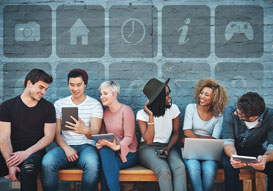
Miguel Angel Mendez on Clubhouse, Accessibility, and the Perception of Disability
“Clubhouse is awesome because it’s exactly what we need to be doing when we’re talking about anything of consequence. We’re talking, we’re listening.”
By Scott Gilman, Staff Writer for UNSUGARCOATED Media
Miguel Angel Mendez is an avid user of Clubhouse, a new social media app designed to connect like-minded people in rooms that function like quorums. There, people voice chat about a subject determined by the room. Miguel has seen many people focusing on the business possibilities of the app, but he’s used it to enrich his personal life. On his profile, Miguel advertises that he can speak at some expert length on pro-wrestling, mid-20th century pop and rap, and the danger of not confronting long held religious and cultural customs.
As a blind man, Miguel has a unique perspective on the format of Clubhouse.
“Being blind has taught me that vision is a powerful sense, but it is very very limiting,” he remarks, elaborating that “The need to satisfy it in one way, shape, or form means that you cut away from the essence of something… And I think that often betrays reality.”
For Miguel, the very nature of Clubhouse- which is by no means perfect as we’ll cover later -forces people to be genuine. The vocal medium makes social media conversations into real conversations and social media followings into real connections.
Miguel’s condition is called Retinitis Pigmentosa. It’s a genetic disorder that he shares with his older sister and younger brother. It starts in childhood and acts slow; Miguel didn’t realize that he’d go completely blind until he was older. When asked about the challenges it posed, though Miguel corrected me, he says, “The real challenges were the challenges people posed once they knew.”
“During my childhood there were messages about it not being okay. I grew up in the church and they were constantly trying to cure it and pray for my vision to be restored,” says Miguel. Though he disclaims that he received many positive messages, much of his environment told him, in his words, “You’re broken and you need to be fixed.”
Miguel is suspicious of social media partially because of his blindness. He’s very familiar with the problems of a surface level perception.
“It’s the preconceived ideas about blindness that society has…the low expectations. Also the surprise that society has that I’d want to be there, that I’d want to have some ambition, that’s the most challenging.”
He finds it hard to believe that you could have a legitimate discourse on something like Instagram or Twitter, where it’s all on the surface level, but he joined Clubhouse to build allyship for the disabled community.
“We see the benefits of allying ourselves with LGBTQ, women, and minorities, even when we’re not those minorities, and it’s wonderful that we’re building that bridge,” Miguel said when addressing the issue. “But I still don’t see that when it comes to disability. And it’s very very odd to me that that’s the case, because disability is indiscriminate, even more so than any other group.”
People don’t listen on social media is Miguel’s primary complaint, and that experience is different for him on Clubhouse.
“It’s almost like they heard my silent message of we need to really really listen and not be visually distracted… We don’t even directly message each other. If you want to directly message someone, go ahead over to Instagram, but here is where we sit and listen.”
Like every space, Clubhouse is not a space made for blind people. Miguel would ask for audio notifications when people enter or leave rooms and auditory indicators of who is speaking. He’s fed as much to the developers when they asked for feedback, and he hopes they’re listening. It would help him read the room, hear everything people say rather than having to break it up to play their name manually, and avoid awkward moments as people exit or enter.
But, Miguel is glad for a space where genuine conversations are enforced by the nature of the medium. He’s encouraged by the allyship that he’s found on the app. He’s especially found satisfaction meeting disabled business owners and uplifting their work.
Miguel and I talked about how the media often presents disabled people- not as people but as success stories. We touched on the inherent imperfections of spaces like Clubhouse that laud their diversity without initially expecting their diverse base. Miguel and I agreed the most important thing for this piece was giving broadly applicable information about this medium to disabled people and hoped to share something of Miguel’s experience in the process.


